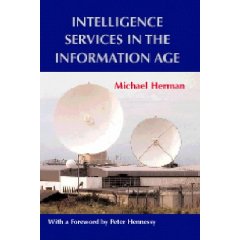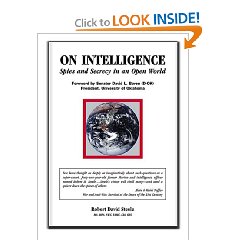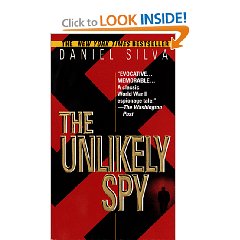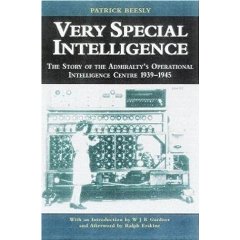Intelligence Power in Peace and War remains the author's greatest work but this collection of well-focused essays, most never before available to the general public, provides a very easy-going (that is to say, easy to read) advanced reader that touches of some vital issues for the future including the restoration of ethics to the practice of intelligence, and the need to internationalize intelligence in the war between governments and gangs or other threats of common concern.
Every essay has its gems, from the first that explores the contradicting views of the essence of intelligence (one view from Kent has it as a particular kind of knowledge, another view has it as defined solely by its secrecy). The author excells at drawing out the relativism of intelligence as well as the changes–more concerned today with the security of others than of one's own state; and more committed (in the best of the services) to forecasting the future rather than manipulating the present.
The essay on intelligence and diplomacy is absolutely vital, beginning with the observation that we are now spending more on intelligence than diplomacy (in the US, 10 times more on secret intelligence than on normal diplomacy). The author concludes, without belaboring the paucity of diplomatic resources, that the UK model of intelligence–the allied model in some respects–has done well in not abusing its special knowledge to influence policy.
Discussing intelligence and the Revolution in Military Affairs, there are several trenchant observations, among the most helpful being that the current RMA is too obsessed with technology applicable to “things” (both as tools and as targets) while completely over-looking a revolution in technology applicable to text and to thinking. This is down-right brilliant and a long over-due issue for policy consideration. Interestingly, the National Imagery and Mapping Commission Report concluded in December 2000 that the USA has spent billions on collection technology during the Cold War, without a commensurate expenditure in what the Americans call TPED: tasking, processing, exploitation, and dissemination. If the Americans are to make a worthy contribution to allied intelligence in the 21st Century, one might hope they heed the author's observation and invest in global multi-lingual open source data ingestion, and multi-media analytic tools for “making sense” of the vast flows of readily available information–most of it not yet digital.
The middle section of the book covers many critical issues including the continued separation of security and and foreign intelligence, a separation that allowed 9-11 to occur in the USA. Among the really brilliant gems in this section: “The best test of an intelligence system is the all-source memory it builds up…” The reader can judge for themselves whether any intelligence organization can pass this rather plain-spoken test. The author is in the vanguard in terms of tapping into external expertise, shifting priorities from collection to analysis, and substantially improving inter-departmental coordination of assessments at the action officer level. Two reviews of Norwegian and New Zealand contributions and issues offer a helpful appreciation of where further gains might be made. Over the course of several chapters the author addresses the lessons of history and answers the question “did intelligence make a difference?” All of this material is quite stimulating, coming as it does from a man who was at the very heart of joint intelligence assessments, and his findings, some negative, must bear on how we adjust to the future.
Good as the first parts are, the best is held for last. Part IV, titled “Intelligence and a Better World”, contains two chapters–one on intelligence and international ethics, the other an afterword on the attacks of 9-11. These two are my most heavily marked sections, and in my own mind represent some of the author's freshest and most valuable thinking. The author is fully aware of the importance of shifting attention to the sub-state and non-state actors, and also of the need to begin sharing all-source intelligence in a multi-lateral fashion, in effect (citing two former US intelligence leaders) treating intelligence as an international good. He carefully explores the ethical and opportunity cost dimensions of covert intelligence activities against other sovereign state (certainly excluding rogue states), concluding that on balance open sources and good analysis are a better bet when combined with the increased trust that could result from eschewing intrusive covert penetrations that are not really necessary in relation to government secrets (terrorists of course being fair game for all available covert methods).
Addressing 9-11, the author has many helpful things to say, among them the observation that “The problems of counter-terrorist intelligence cannot be solved just by throwing money at them.” He ends with the compelling observation that the United States of America is incapable of protecting itself from international threats, even with its vast resources, unless it first devises new means of sharing intelligence and cooperating more closely with all other governments. I agree with him. Both “hard targets” and “global coverage” are beyond the ken of any single nation, and the “new craft of intelligence” that I and others are devising seeks to harness the full distributed intelligence of the Whole Earth–not just the intelligence of governments, but of legal non-state actors and citizens–the intelligence “minutemen” of the future. There are perhaps twelve really high-caliber commentators on intelligence in the English-speaking language, but this author, Michael Herman, continues to be the soft-spoken master of the domain–offering the best combination of erudition, experience, and ethical grounding–and we are lucky to have this book from him to help us all as we seek to revitalize intelligence in the aftermath of 9-11.
This book is especially recommended as a reader for university classes, and one hopes that gradually it will be understood within academia and business that intelligence is not some arcane secret priesthood, but rather the essence of governance in the age of information. The author, and this book, are most helpful contributors to the “Great Conversation”.










